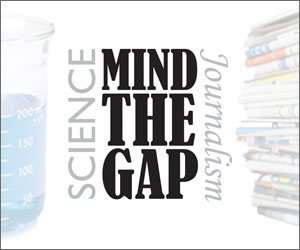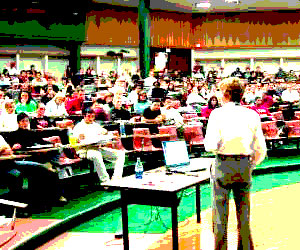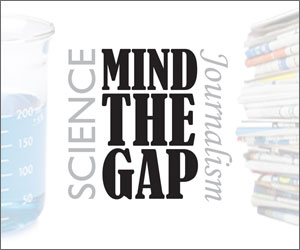 The other day I was talking to my parents via Skype when we were rudely interrupted by a very loud bird. It was a starling, and it was hanging out on the chimney, its (very loud) song echoing down into my parents’ living room.
The other day I was talking to my parents via Skype when we were rudely interrupted by a very loud bird. It was a starling, and it was hanging out on the chimney, its (very loud) song echoing down into my parents’ living room.
Flyceum: Your Science. Your Career.
We’re following in the tradition of open discussions among scientists that has resulted in important advances in both science and society.
Is There Really Science in the Twitterverse?
by
 Hello BenchFly readers! It’s been quite awhile since my last edition, and I apologize for my absence. The life of a scientist… you know? But enough of that- down to my latest instalment. I was all set to give you an instructive, fun article on signal transduction, but events over the past few weeks have inspired me to deviate from the standard Enzyme Corner recipe to bring you something different. Without further ado, through the magic of social media I am here to talk to you about… the magic of social media… or is it the myth? In particular, I’m curious about the place of science within the Twitterverse.
Hello BenchFly readers! It’s been quite awhile since my last edition, and I apologize for my absence. The life of a scientist… you know? But enough of that- down to my latest instalment. I was all set to give you an instructive, fun article on signal transduction, but events over the past few weeks have inspired me to deviate from the standard Enzyme Corner recipe to bring you something different. Without further ado, through the magic of social media I am here to talk to you about… the magic of social media… or is it the myth? In particular, I’m curious about the place of science within the Twitterverse.
How to Leave a Postdoc Quickly with Your Reputation Intact
by
I started my postdoc in November. As much as I would like to say that it is going great, that is not the case. I have tried to work it out so far but I am thinking of changing the lab to find another postdoc or more ideally, a job in an industry. I will be quite obviously asked the reason of having such a short time in my postdoc. I am wondering what is the exact way of saying that without sounding like someone who is difficult to work with. I do not wish to personally attack my mentor. Also, does having a postdoc usually impact the process of getting a new job? My Ph.D. advisors and committee members can give a great recommendation for me but that will not be the case with my current advisor. Please help! and thank you!
Darya, Postdoc
All the Better to See Sperm Whales With, My Dear.
by
 The colossal squid has the largest eyes on the planet, but it remains a mystery as to why. These soccer ball-sized eyes are almost three times the size of the second largest animal eyes (those of the sperm whale reach 109mm in diameter), and up until now they were thought to have a diameter of 250 to 400mm. However studying them has proved challenging, as these underwater giants are extremely elusive.
The colossal squid has the largest eyes on the planet, but it remains a mystery as to why. These soccer ball-sized eyes are almost three times the size of the second largest animal eyes (those of the sperm whale reach 109mm in diameter), and up until now they were thought to have a diameter of 250 to 400mm. However studying them has proved challenging, as these underwater giants are extremely elusive.
Saw VII: The Revenge of the Sawfish
by
 This is a sawfish. I’m pretty sure it’s named for its large, chainsaw like, nose (I know, it’s not really its nose, but I’ll get to that in a second), but I could be wrong. And until recently, what the sawfish does with its saw has been a bit of a mystery.
This is a sawfish. I’m pretty sure it’s named for its large, chainsaw like, nose (I know, it’s not really its nose, but I’ll get to that in a second), but I could be wrong. And until recently, what the sawfish does with its saw has been a bit of a mystery.
Sawfish are a species of ray, and live in both salty and fresh water in the sub-tropics. What I incorrectly referred to as its nose is actually called a rostrum, and is an extension of the fish’s cranium. It is made of cartilage, save for the boney teeth that stud the periphery. But unfortunately this rostrum, due to its propensity to get tangled in fishing nets and lines, has resulted in a dramatic decline in the number of these fish, and they are now considered critically endangered.
How to Establish and Enforce the Chain of Command in Lab
by
I recently completed my postdoc (finally!) and took a job at a small company, who shall remain nameless. I am generally a very respectful person, both of people’s position within the company and their tenure there. However, there seems to be one employee who is technically lower than me by title, but who has been at the company for 6 years and they treat me like I’m their personal technician. I don’t want to be a jerk, but how can I make it clear that they’re supposed to do what I say, not the other way around?
Newby, Scientist I
Caution: Objects May Appear Larger Than They Really Are
by
I am terrified of cockroaches. The high-pitched-screaming, jumping-on-a-chair, shaking-in-my-boots kind of terrified. Before my department moved into the lovely facility I work in now, the labs were located in a rather dilapidated building that was infested with South American cockroaches. They usually hung out in the autoclave room, but every so often they would venture out for a joyride in the elevator. After discovering this the hard way, I exclusively took the stairs. [Continue Reading…]
From Academic Bench Chemist to Freelance Science Writer
by
 Given that finely-honed writing skills are an essential component of successful research, it should come as no surprise that many graduate students and postdocs gravitate toward science journalism as a career option. What is surprising, however, is the lack of guidance we’re given in pursuit of this goal. To see how one scientist made the transition, we spoke with Katharine Sanderson, freelance science writer and former chemist, about her unconventional path to journalism and the lessons she’s learned along the way.
Given that finely-honed writing skills are an essential component of successful research, it should come as no surprise that many graduate students and postdocs gravitate toward science journalism as a career option. What is surprising, however, is the lack of guidance we’re given in pursuit of this goal. To see how one scientist made the transition, we spoke with Katharine Sanderson, freelance science writer and former chemist, about her unconventional path to journalism and the lessons she’s learned along the way.
The Forgotten Element of Graduate School: Coursework
by
 A member of my dissertation committee once remarked “Grades will keep you in graduate school but research will get you out.” The implication was that coursework is a necessary evil on the road to a Ph.D. Indeed, most of the discussions on BenchFly focus on research projects, research advisors, scoring the big paper or passing the dreaded prelim exam. However, the fact is that graduate students spend most of their first year-and-a-half or two years taking courses while they do research rotations and begin their research projects. Someone is paying for that coursework, students are spending a lot of time taking it, and faculty are spending time teaching it. So what is everyone getting for their money and time?
A member of my dissertation committee once remarked “Grades will keep you in graduate school but research will get you out.” The implication was that coursework is a necessary evil on the road to a Ph.D. Indeed, most of the discussions on BenchFly focus on research projects, research advisors, scoring the big paper or passing the dreaded prelim exam. However, the fact is that graduate students spend most of their first year-and-a-half or two years taking courses while they do research rotations and begin their research projects. Someone is paying for that coursework, students are spending a lot of time taking it, and faculty are spending time teaching it. So what is everyone getting for their money and time?
Walking the Thin Line Between a Great Result and a Lie
by
My PI often overstates my results when he presents my work in talks. How do I know if it’s just a little bit of hype versus being a lie, or even worse unethical?
– TJ, grad student





